
survival russia and the world pdf
Discover how to survive in Russia and globally. Expert tips and strategies in this comprehensive PDF guide.
Survival in Russia and the world is shaped by geopolitical tensions‚ economic challenges‚ and societal impacts. Understanding these dynamics is crucial for global stability and security.
1.1. Overview of the Topic
The topic of survival in Russia and the world encompasses a broad analysis of geopolitical tensions‚ economic challenges‚ and societal resilience. It explores how global events‚ such as conflicts and sanctions‚ impact survival strategies in Russia and beyond. The interplay of historical context‚ political stability‚ and international relations shapes the dynamics of survival in both local and global contexts‚ offering insights into how nations and individuals adapt to crises and uncertainty. This overview sets the stage for understanding these complex dynamics.
1.2. Importance of Understanding Survival Strategies
Understanding survival strategies in Russia and the world is critical for navigating geopolitical tensions‚ economic instability‚ and societal challenges. These strategies provide insights into resilience-building‚ crisis management‚ and adaptability‚ essential for individuals and nations alike. By analyzing historical and contemporary approaches‚ one can better comprehend how to mitigate risks and foster stability in a volatile global landscape. This knowledge is vital for informed decision-making and ensuring long-term security in an increasingly interconnected world.

Historical Context of Survival in Russia
Russia’s survival strategies are rooted in its turbulent history‚ from Soviet-era resilience to post-Soviet economic challenges‚ shaping a nation adept at adapting to adversity and uncertainty.
2.1. Soviet Era and Its Impact on Survival
The Soviet era laid the foundation for Russia’s survival strategies‚ marked by centralization and resilience. During this period‚ citizens adapted to economic hardships‚ political repression‚ and limited resources. The state’s control over agriculture and industry forced communities to rely on informal networks and resourcefulness. The Cold War further intensified survival instincts‚ as the nation faced global tensions and the constant threat of conflict. These experiences shaped a culture of self-reliance and adaptability‚ which continue to influence Russia’s approach to challenges today.
2.2. Post-Soviet Transition and Challenges
The post-Soviet era brought immense challenges‚ as Russia transitioned from a centralized economy to a market-based system. Economic instability‚ hyperinflation‚ and the rise of oligarchs reshaped society. Millions faced poverty and inequality‚ while the government struggled to maintain stability. The collapse of social services and infrastructure further exacerbated hardships. This period marked a shift in survival strategies‚ as individuals adapted to new realities‚ relying on informal networks and resilience to navigate the uncertain landscape of post-Soviet Russia.
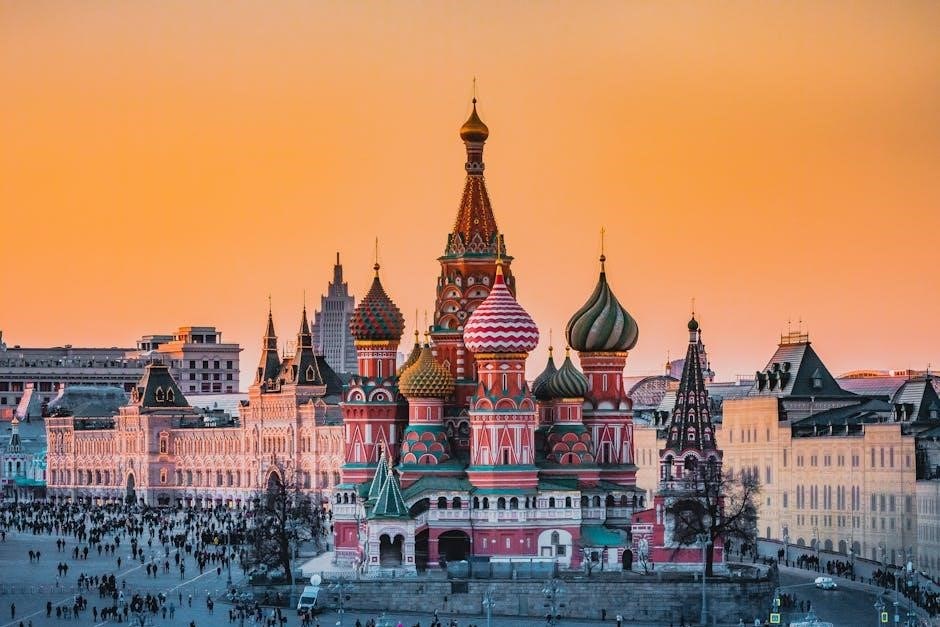
Geopolitical Implications of Russia’s Actions
Russia’s actions significantly impact global power dynamics‚ provoking tensions and reshaping alliances. Its strategies influence international relations‚ sovereignty‚ and stability‚ affecting the world’s geopolitical landscape profoundly.
3.1. Russia’s Role in Global Conflicts
Russia plays a pivotal role in global conflicts‚ often acting as a key protagonist or mediator. Its involvement in regions like Ukraine has escalated tensions‚ drawing international condemnation and economic sanctions. Moscow’s strategic moves aim to assert influence and protect its interests‚ while its support for certain regimes complicates conflict resolution. The consequences of Russia’s actions ripple across the globe‚ affecting energy markets‚ security alliances‚ and humanitarian efforts‚ making its role both controversial and critical in shaping modern geopolitics.
3.2. Impact of Sanctions and Economic Warfare
Economic sanctions imposed on Russia have significantly impacted its economy‚ limiting access to international markets and disrupting trade flows. These measures have caused currency fluctuations‚ inflation‚ and reduced foreign investment. Russia has responded by diversifying its economy and seeking alternative alliances‚ but the long-term effects remain uncertain. The global economy also feels the strain‚ particularly in energy markets‚ as Russia is a major supplier. This economic warfare has far-reaching consequences‚ influencing political stability and societal well-being both domestically and internationally.

Military and Strategic Aspects
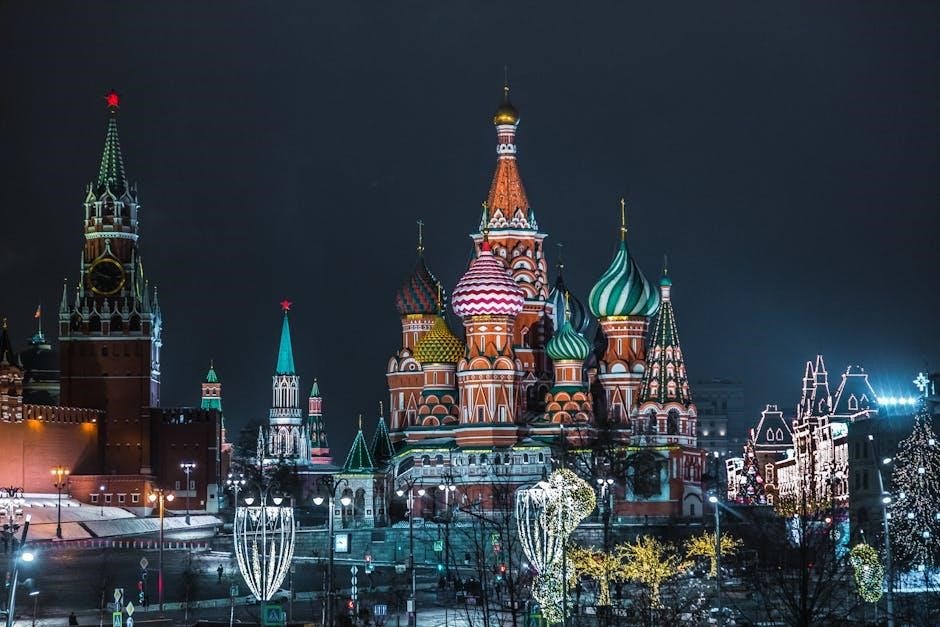
Russia’s military strategy focuses on defending sovereignty and strategic interests‚ leveraging advanced weaponry and cybersecurity to counter global threats and maintain influence in international conflicts.
4.1. Russia’s Military Strategy and Capabilities
Russia’s military strategy emphasizes the protection of national sovereignty and strategic interests through a combination of conventional and nuclear deterrence. Its capabilities include advanced naval and air forces‚ alongside a strong emphasis on cybersecurity and electronic warfare. Russia has demonstrated its military prowess in various conflicts‚ showcasing its ability to adapt to modern warfare dynamics. These strategic elements are integral to its role in global security and power projection‚ ensuring Russia remains a key player in international relations.
4.2. Global Military Alliances and Responses
Global military alliances‚ such as NATO and the U.S. with its allies‚ have strengthened their strategies to counterbalance Russia’s actions. Enhanced defense capabilities‚ increased military aid to Ukraine‚ and strategic troop deployments highlight the unified response. These alliances emphasize collective security and deterrence‚ ensuring stability in conflict zones. Their coordinated efforts reflect a commitment to countering Russia’s influence while maintaining global security and fostering international cooperation to address emerging threats effectively.
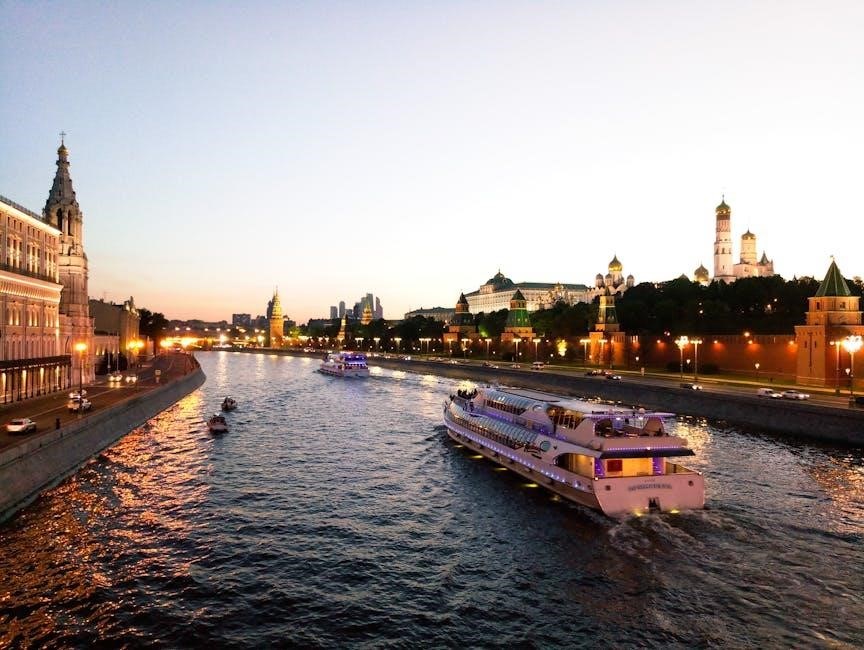
Economic Factors Influencing Survival
Economic sanctions‚ energy market dynamics‚ and trade restrictions significantly influence survival strategies‚ impacting Russia’s economy and global stability amid geopolitical tensions and shifting resource dependencies worldwide.
5.1. Economic Sanctions and Their Effects
Economic sanctions imposed on Russia have significantly disrupted global trade and financial systems‚ isolating Russia from international markets. These sanctions target key sectors like energy and finance‚ leading to currency devaluation and inflation. Russia has responded by diversifying its energy exports and relying on alternative payment systems. However‚ the long-term effects include reduced foreign investment and slowed economic growth. The sanctions also impact global markets‚ causing energy price volatility and supply chain disruptions‚ highlighting the interconnected nature of economic stability and geopolitical conflicts.
5.2. Energy Politics and Global Markets
Russia’s energy politics significantly influence global markets‚ as it remains a major supplier of oil and natural gas. Geopolitical tensions have led to volatility in energy prices‚ affecting economies worldwide. Europe has sought to reduce dependence on Russian energy‚ accelerating renewable energy adoption. Meanwhile‚ Russia has diversified its energy exports to other regions. This shift underscores the interconnectedness of energy security and global stability‚ with Russia leveraging its resources to maintain influence in a changing world energy landscape.

Societal Impact and Humanitarian Concerns
Russia’s actions have sparked significant societal impacts‚ including human rights violations and mass displacement. These crises underscore the urgent need for global humanitarian intervention and stability.
6.1. Human Rights and Civil Liberties
Human rights violations in Russia and globally pose significant challenges for survival. Restrictions on free speech‚ assembly‚ and political dissent undermine civil liberties‚ creating an environment of fear and repression. The targeting of activists‚ journalists‚ and minorities highlights the erosion of human rights standards. These issues are exacerbated by conflicts and authoritarian governance‚ threatening global stability and human dignity. Addressing these concerns is essential for ensuring survival and fostering a just society worldwide.
6.2. Refugee Crises and Displacement
Russia’s actions‚ particularly in Ukraine‚ have triggered massive displacement‚ creating a global refugee crisis. Millions flee war zones‚ seeking safety in neighboring countries. This exodus strains host nations’ resources and highlights the humanitarian toll of conflict. International cooperation is critical to address this crisis‚ ensuring aid reaches those in need. The survival of displaced populations depends on global solidarity and effective strategies to mitigate the impact of forced migration‚ fostering stability in a world grappling with insecurity.
Global Responses and International Relations
International alliances are uniting to counter Russia’s actions‚ with NATO and Western nations imposing sanctions and strengthening military support for Ukraine to ensure global security and stability.
7.1. NATO and European Security
NATO has strengthened its military presence in Eastern Europe‚ enhancing collective defense capabilities to counter Russia’s actions. Member states are increasing defense spending and deploying additional troops to vulnerable regions. The alliance is also expanding its strategic partnerships to ensure a unified response to security threats. This heightened focus on European security reflects NATO’s commitment to maintaining stability in the face of geopolitical tensions‚ ensuring that member nations remain protected and resilient against potential aggression.
7.2. Role of the United States and Allies
The United States and its allies have played a pivotal role in supporting Ukraine‚ providing military aid‚ economic sanctions‚ and diplomatic backing. This collective effort aims to deter Russian aggression and uphold global security norms. The U.S. has also strengthened NATO’s eastern flank‚ ensuring a unified defense strategy. Additionally‚ Western allies are coordinating on energy security and cyber defense‚ showcasing a multi-faceted approach to countering Russia’s influence and ensuring regional stability in Europe and beyond.
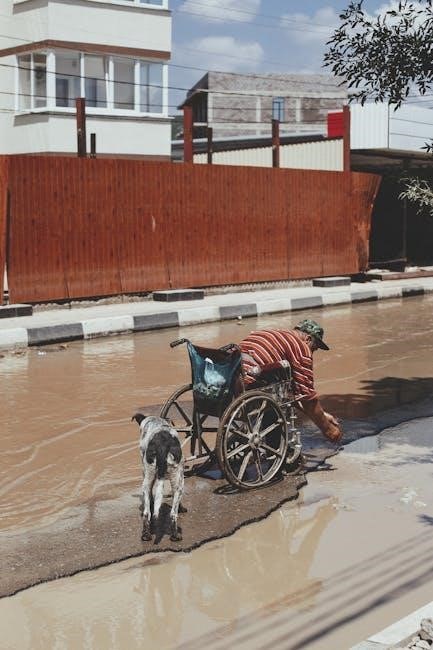
Technological and Cyber Warfare
Technological advancements and cyber warfare play a critical role in modern conflict‚ with Russia employing digital tactics to disrupt global systems and influence geopolitical outcomes effectively.
8.1. Cyber Attacks and Digital Warfare
Russia’s cyber strategies in global conflicts have escalated‚ targeting critical infrastructure‚ such as power grids and financial systems. These attacks aim to disrupt operations and create societal instability. State-sponsored groups and hackers align with Russian interests‚ conducting sophisticated operations to compromise national security. The goal is to destabilize economies and governments‚ leveraging digital warfare as a modern weapon. This approach underscores Russia’s evolving tactics in contemporary warfare‚ blending traditional military strength with advanced cyber capabilities to achieve strategic objectives effectively. The impact of these attacks resonates globally‚ highlighting the vulnerability of interconnected systems and the need for robust defenses in an increasingly digital world.
8.2. Technological Advancements in Defense
Technological advancements in defense have become pivotal for global security‚ with nations investing heavily in cutting-edge innovations. Russia focuses on developing hypersonic missiles and advanced surveillance systems to maintain strategic superiority. Meanwhile‚ the West prioritizes AI-driven defense mechanisms and cybersecurity solutions to counter emerging threats. These technological strides aim to enhance military capabilities‚ ensuring readiness for future conflicts and safeguarding national interests in an increasingly competitive geopolitical landscape. The race for technological dominance continues to shape modern defense strategies worldwide.
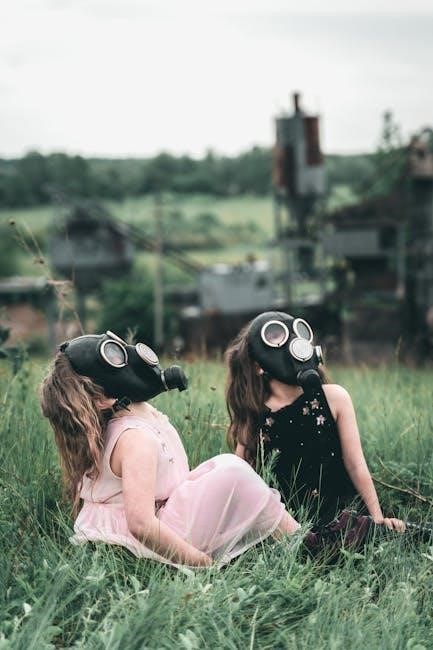
Environmental and Climate Challenges
Environmental and climate challenges pose significant risks to Russia and the world. Rising temperatures and extreme weather events demand urgent global strategies for sustainable survival and adaptation.
9.1. Climate Change Impact on Russia
Climate change significantly affects Russia‚ with rising temperatures and extreme weather events altering ecosystems and infrastructure. Thawing permafrost threatens northern regions‚ while increased wildfires and resource scarcity strain local communities. Russia’s vast landmass and natural resources make it vulnerable to environmental shifts‚ necessitating urgent adaptation strategies to mitigate long-term damage and ensure sustainable survival in a rapidly changing world.
9.2. Global Environmental Strategies
Global environmental strategies aim to address climate change through international cooperation and sustainable practices. Initiatives like the Paris Agreement and UN-led programs promote carbon reduction and renewable energy adoption. Countries are investing in green technologies and infrastructure to mitigate environmental impacts. These efforts foster resilience and ensure a sustainable future‚ crucial for survival in a world facing escalating climate challenges.
Future Projections and Scenarios
Future projections highlight potential global conflicts and strategies for stability. Russia’s role in shaping these scenarios remains critical‚ influencing international relations and survival in a changing world.
10.1. Potential Global Conflicts
Potential global conflicts involving Russia could escalate in regions like Ukraine‚ the Baltics‚ and Central Asia. Economic sanctions and geopolitical tensions may intensify‚ while military strategies adapt to new threats. The role of NATO and the U.S. in supporting vulnerable regions remains critical. Cyber warfare and nuclear deterrence add layers of complexity. Experts warn of a heightened risk of miscalculations leading to broader conflicts. Diplomatic efforts are essential to mitigate these risks and ensure global stability in the face of evolving challenges.
10.2. Strategies for a Stable Future
Strategies for a stable future involve strengthening international alliances‚ promoting diplomacy‚ and addressing economic disparities; Enhancing cybersecurity and nuclear deterrence frameworks can mitigate global risks. Encouraging sustainable development and environmental cooperation fosters long-term stability. Building resilience against geopolitical shocks is crucial. Think tanks like RUSI and IISS emphasize the importance of adaptive strategies to navigate complex conflicts. Collaborative efforts between nations‚ focusing on shared goals‚ are essential for creating a more secure and prosperous world‚ ensuring survival and stability for future generations.